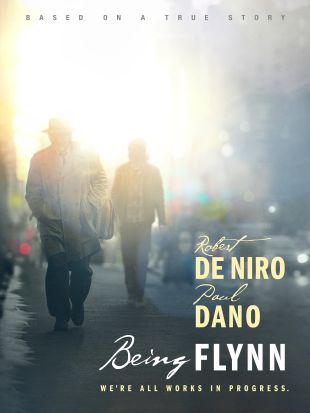
It takes remarkable artistic cojones to open your film with Robert De Niro walking into a taxi-dispatch office, getting into a cab, and driving out onto the mean streets, but that's exactly how director Paul Weitz chooses to open Being Flynn. That decision forces us to make constant comparisons to Martin Scorsese's iconic Taxi Driver, and it does Weitz's film a terrible disservice.
The movie actually stars Paul Dano as Nick Flynn, a young man in his twenties floundering his way through the big city who, after being dumped by his girlfriend for cheating on her, ends up working at a homeless shelter. His goal is to write, in part because his father Jonathan (De Niro), who Nick hasn't heard from in 18 years, always claimed to be the third-greatest American writer of all time, even though he was actually a criminal.

As Nick settles into his new responsibilities at the shelter, which is overseen by the benevolent but no-nonsense Captain (Wes Studi), he gets a call from Jonathan, who needs help moving after being evicted. They meet, Jonathan is obviously an alcoholic mess, and Nick thinks that's the end of it. But in a short period of time, Jonathan loses his cabbie job and ends up a resident at the shelter where Nick works, and soon Jonathan's paranoid racist rants and outsized personality lead to clashes with the staff.
Along the way, Nick starts a tentative relationship with his strong-willed co-worker Denise (Olivia Thirlby), struggles with his own chemical-dependency issues, and tries to come to terms with his troubled father.
Based on a memoir by the poet Nick Flynn the movie never quite gets the dramatic balance right. This is Nick's movie, and the parts of his life that have nothing to do directly with his father are more interesting. Dano is well cast, his childlike face is a constant reminder that Nick is nowhere close to being a grown-up, and Denise is a fascinating character, someone who is afraid that love comes too close to dangerous self-delusion. The early sections of the film, when Nick is learning how the shelter runs and getting to know his other co-workers, have an authenticity that's intriguing -- we feel the day-to-day rhythms of the place.
However, just as that gets established, we revert to the story between father and son, and the movie becomes a slog -- an endurance test designed to see how much ranting and raving the audience can take from De Niro's thoroughly unstable character. Jonathan can be a relentless charmer, but he's full of racism, aggression, and ego; nobody says it, but it's fairly obvious he has some form of mental illness. The whole thing becomes a showcase for De Niro instead of a movie about the son, and in that regard Weitz's film fails. Jonathan Flynn isn't Travis Bickle in any way other than they're both undiagnosed schizophrenics, and it's sad to watch De Niro pour his energy into material so dull he can't elevate it. He's not on auto-pilot here by any means, but Jonathan just isn't compelling, and neither is Being Flynn.
